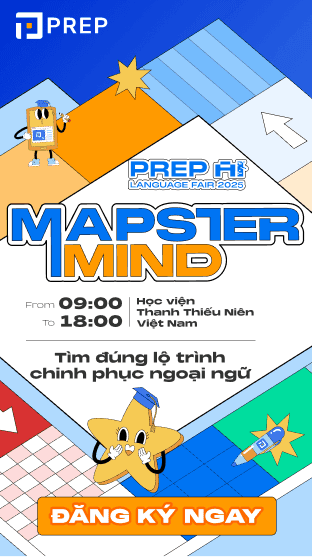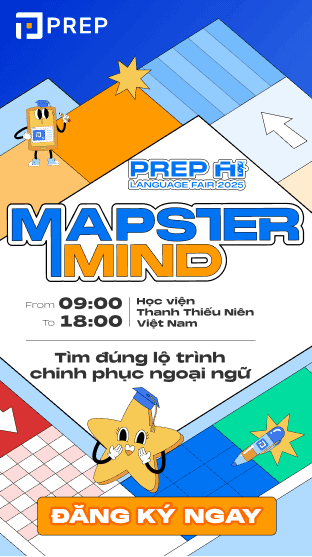Giải đề chi tiết Cambridge IELTS 16, Test 1, Listening Part 4: Stoicism
Đề Listening part 4 trong Cambridge 16 là một đề khá cơ bản, có nhiều từ vựng chuyên ngành hay. Trong bài viết sau, cùng Prep tìm hiểu chi tiết đề bài, đáp án và giải thích đáp án chi tiết của đề Cambridge IELTS 16, Test 1, Listening Part 4: Stoicism nhé!
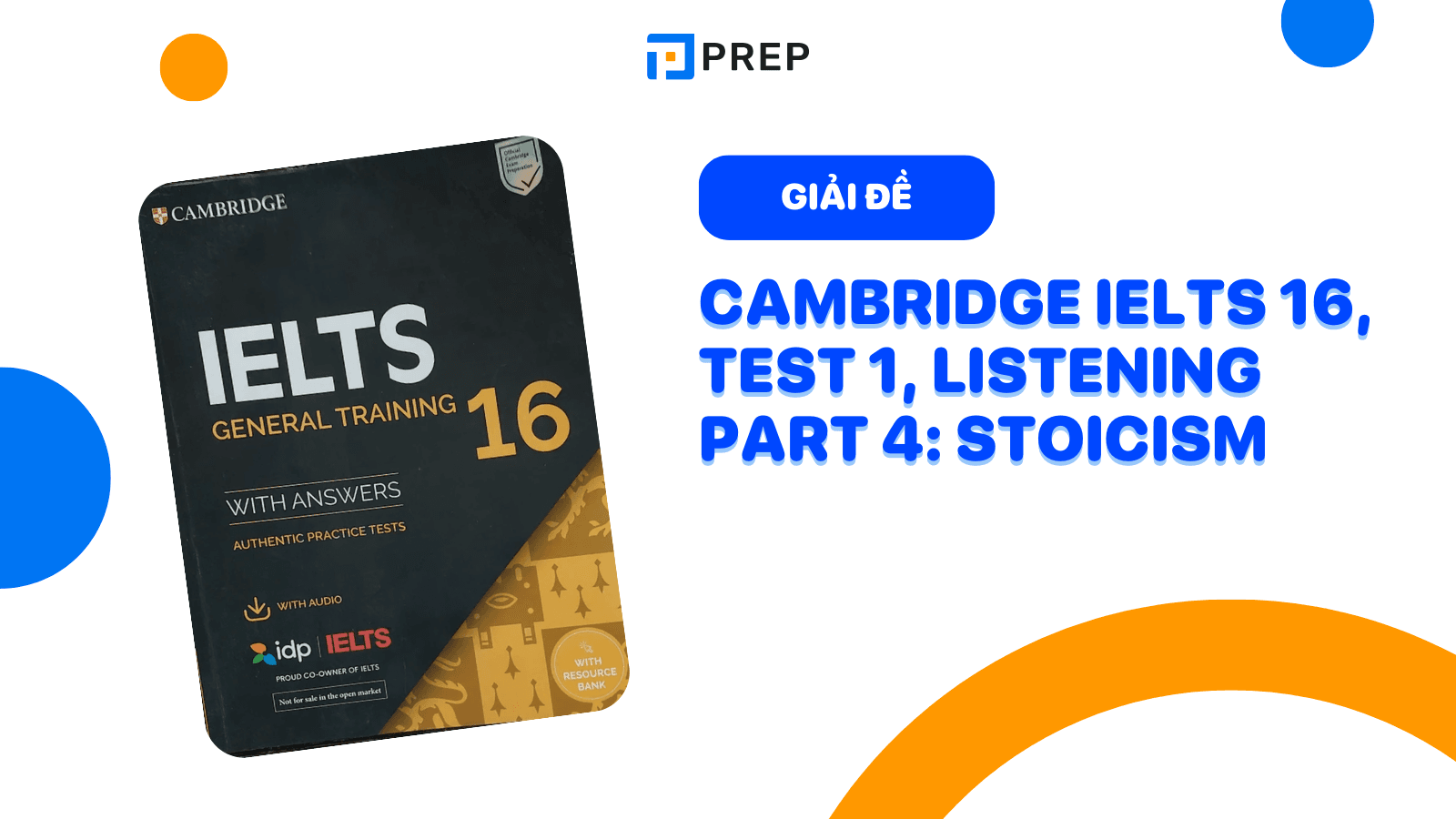
I. Đề Cambridge IELTS 16 Test 1 Listening Part 4: Stoicism
Stoicism
Stoicism is still relevant today because of its 31 __________ appeal.
Ancient Stoics
-
Stoicism was founded over 2,000 years ago in Greece.
-
The Stoics' ideas are surprisingly well known, despite not being intended for 32 __________.
Stoic principles
-
Happiness could be achieved by leading a virtuous life.
-
Controlling emotions was essential.
-
Epictetus said that external events cannot be controlled but the 33 __________ people make in response can be controlled.
-
A Stoic is someone who has a different view on experiences which others would consider as 34 __________.
The influence of Stoicism
-
George Washington organised a 35 __________ about Cato to motivate his men.
-
The French artist Delacroix was a Stoic.
-
Adam Smith's ideas on 36 __________ were influenced by Stoicism.
-
Some of today's political leaders are inspired by the Stoics.
-
Cognitive Behaviour Therapy (CBT)
-
the treatment for 37 __________ is based on ideas from Stoicism
-
people learn to base their thinking on 38 __________.
-
-
In business, people benefit from Stoicism by identifying obstacles as 39 __________.
Relevance of Stoicism
- It requires a lot of 40 __________ but Stoicism can help people to lead a good life.
- It teaches people that having a strong character is more important than anything else.
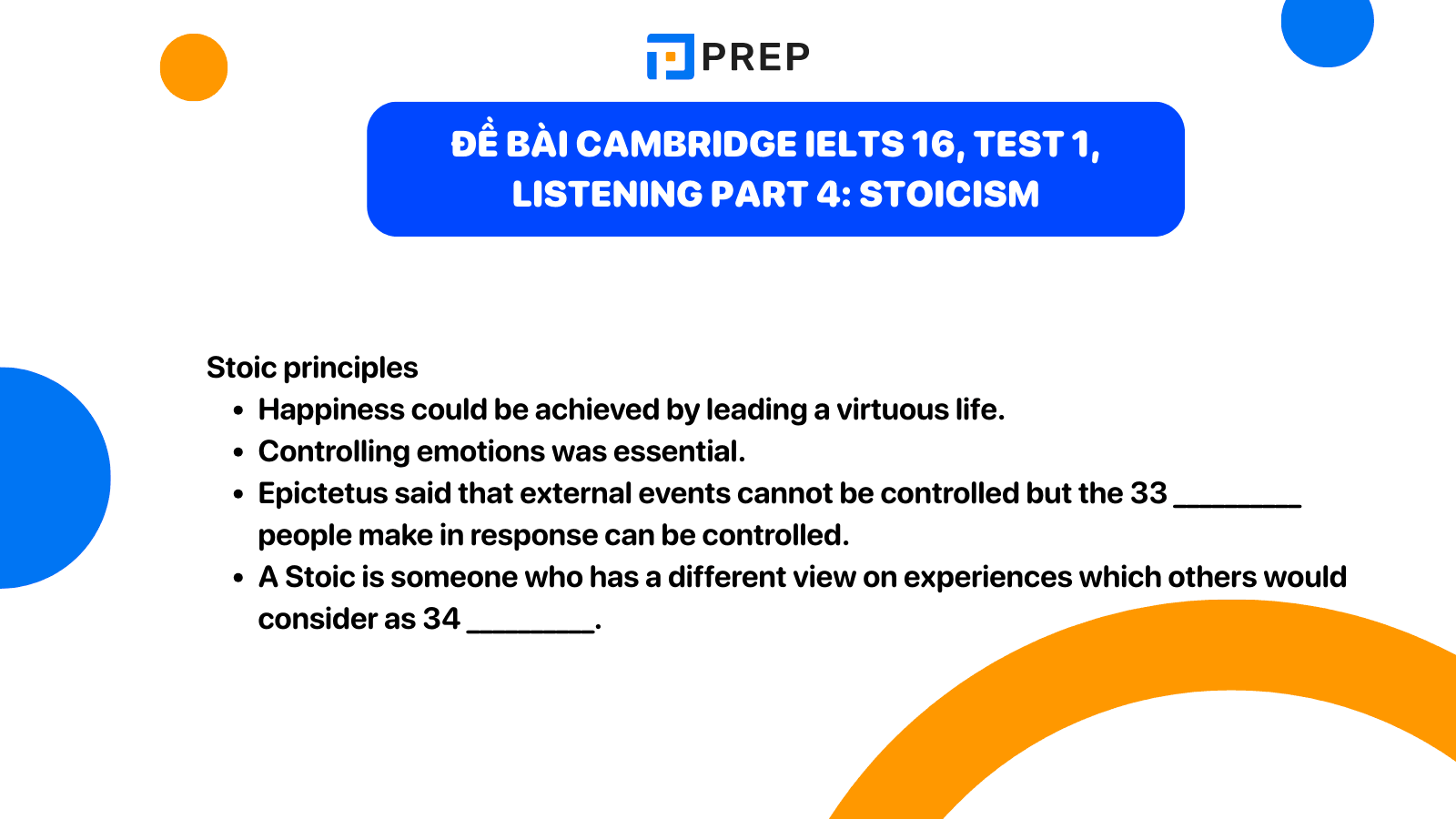
Xem thêm: Download 10+ bộ đề thi nghe IELTS có đáp án!
II. Đáp án bài Stoicism
|
Câu hỏi |
Đáp án |
|
31 |
practical |
|
32 |
publication |
|
33 |
choices |
|
34 |
negative |
|
35 |
play |
|
36 |
capitalism |
|
37 |
depression |
|
38 |
logic |
|
39 |
opportunity |
|
40 |
practice / practise |
III. Transcript bài nghe
Ancient philosophy is not just about talking or lecturing, or even reading long, dense books.
In fact, it is something people have used throughout history - to solve their problems and to achieve their greatest triumphs.
Specifically, I am referring to Stoicism, which, in my opinion, is the most practical of all philosophies and therefore the most appealing.
Stoicism was founded in Ancient Greece by Zeno of Citium in the early 3rd century BC, but was practised by the likes of Epictetus, Cato, Seneca and Marcus Aurelius.
Amazingly, we still have access to these ideas, despite the fact that the most famous Stoics never wrote anything down for publication.
Cato definitely didn't.
Marcus Aurelius never intended his Meditations to be anything but personal.
Seneca's letters were, well, letters and Epictetus' thoughts come to us by way of a note-taking student.
Stoic principles were based on the idea that its followers could have an unshakable happiness in this life and the key to achieving this was virtue.
The road to virtue, in turn, lay in understanding that destructive emotions, like anger and jealousy, are under our conscious control - they don't have to control us, because we can learn to control them.
In the words of Epictetus: "external events I cannot control, but the choices I make with regard to them, I do control".
The modern day philosopher and writer Nassim Nicholas Taleb defines a Stoic as someone who has a different perspective on experiences which most of us would see as wholly negative; a Stoic "transforms fear into caution, pain into transformation, mistakes into initiation and desire into undertaking".
Using this definition as a model, we can see that throughout the centuries Stoicism has been practised in more recent history by kings, presidents, artists, writers and entrepreneurs.
The founding fathers of the United States were inspired by the philosophy.
George Washington was introduced to Stoicism by his neighbours at age seventeen, and later, put on a play based on the life of Cato to inspire his men.
Thomas Jefferson kept a copy of Seneca beside his bed.
Writers and artists have also been inspired by the stoics.
Eugène Delacroix, the renowned French Romantic artist (known best for his painting Liberty Leading the People) was an ardent Stoic, referring to it as his "consoling religion".
The economist Adam Smith's theories on capitalism were significantly influenced by the Stoicism that he studied as a schoolboy, under a teacher who had translated Marcus Aurelius' works.
Today's political leaders are no different, with many finding their inspiration from the ancient texts.
Former US president Bill Clinton rereads Marcus Aurelius every single year, and many have compared former President Obama's calm leadership style to that of Cato.
Wen Jiabao, the former prime minister of China, claims that Meditations is one of two books he travels with and that he has read it more than one hundred times over the course of his life.
Stoicism had a profound influence on Albert Ellis, who invented Cognitive Behaviour Therapy, which is used to help people manage their problems by changing the way that they think and behave.
It's most commonly used to treat depression.
The idea is that we can take control of our lives by challenging the irrational beliefs that create our faulty thinking, symptoms and behaviours by using logic instead.
Stoicism has also become popular in the world of business.
Stoic principles can build the resilience and state of mind required to overcome setbacks because Stoics teach turning obstacles into opportunity.
A lesson every business entrepreneur needs to learn.
I would argue that studying Stoicism is as relevant today as it was 2,000 years ago, thanks to its brilliant insights into how to lead a good life.
At the very root of the thinking, there is a very simple way of living - control what you can and accept what you can't.
This is not as easy as it sounds and will require considerable practice - it can take a lifetime to master.
The Stoics also believed the most important foundation for a good and happy life is not money, fame, power or pleasure, but having a disciplined and principled character - something which seems to resonate with many people today.
IV. Giải thích đáp án chi tiết
31. practical: Ngay từ đầu bài nói, diễn giả đã đề cập đến lý do chủ nghĩa Khắc kỷ vẫn còn phù hợp là do tính ứng dụng của nó. Từ "practical" (thực tế, thiết thực) là từ khóa chính.
32. publication: Khi nói về các nhà Khắc kỷ cổ đại, người nói đề cập rằng ý tưởng của họ không phải để xuất bản rộng rãi. Từ "publication" (sự xuất bản) là đáp án đúng.
33. choices: Triết gia Epictetus được trích dẫn: "external events cannot be controlled but the choices people make in response can be controlled."
34. negative: Người nói định nghĩa người theo chủ nghĩa Khắc kỷ là người có góc nhìn khác với những trải nghiệm mà người khác coi là "negative" (tiêu cực).
35. play: Khi nói về ảnh hưởng của chủ nghĩa Khắc kỷ, diễn giả nhắc đến George Washington đã tổ chức một "play" (vở kịch) về Cato để khích lệ binh lính của mình.
36. capitalism: Diễn giả liệt kê các nhân vật nổi tiếng bị ảnh hưởng, bao gồm Adam Smith, người có ý tưởng về "capitalism" (chủ nghĩa tư bản) chịu ảnh hưởng từ triết học này.
37. depression: Khi nói về CBT, người nói cho rằng phương pháp điều trị "depression" (trầm cảm) được dựa trên các ý tưởng từ chủ nghĩa Khắc kỷ.
38. logic: CBT dạy mọi người học cách dựa vào "logic" (lý trí, logic) trong suy nghĩ của họ.
39. opportunity: Trong kinh doanh, người nói đề cập rằng người ta coi chướng ngại vật là một "opportunity" (cơ hội) thay vì là vấn đề.
40. practice / practise: Câu cuối cùng tóm tắt rằng chủ nghĩa Khắc kỷ đòi hỏi rất nhiều "practice" (thực hành) để có thể giúp con người sống tốt. Cả hai cách viết đều đúng.
V. Từ vựng hay trong bài đọc
Một số từ vựng hay trong bài đọc bạn cần nhớ đó là:
-
practical: thực tế, thiết thực
-
publication: sự xuất bản
-
choices: sự lựa chọn
-
negative: tiêu cực
-
virtuous: có đạo đức, đức hạnh
-
capitalism: chủ nghĩa tư bản
-
depression: bệnh trầm cảm
-
logic: lý trí, logic
-
obstacle: chướng ngại vật
-
opportunity: cơ hội
-
practice: sự thực hành
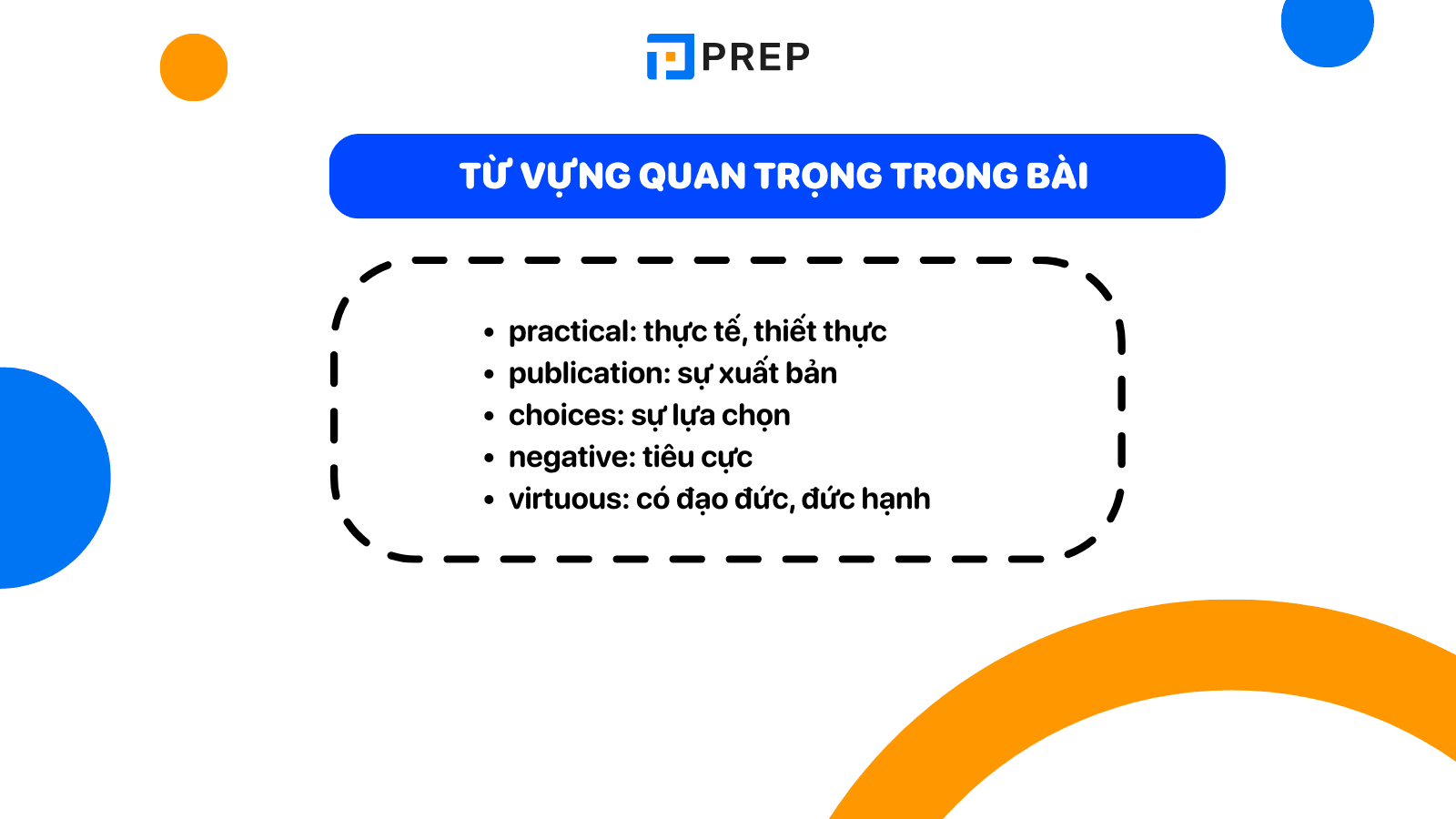
Trên đây là đề bài, transcript và đáp án kèm giải thích chi tiết của Cambridge IELTS 16, Test 1, Listening Part 4: Stoicism mà Prep đã biên soạn. Hy vọng tài liệu trên sẽ giúp bạn học hiệu quả và chinh phục được band điểm như mong đợi nhé!
Học tiếng Anh online dễ dàng hơn với PREP - Nền tảng Học & Luyện thi thông minh cùng AI. Nhờ công nghệ AI độc quyền, bạn có thể tự học trực tuyến ngay tại nhà, chinh phục lộ trình học IELTS, TOEIC, tiếng Anh giao tiếp hiệu quả. Bên cạnh đó, học viên còn có sự hỗ trợ tuyệt vời từ Teacher Bee AI, trợ lý ảo giúp bạn giải đáp thắc mắc và đồng hành 1-1 trong suốt quá trình học tập. Hãy click TẠI ĐÂY hoặc liên hệ HOTLINE 0931428899 để nhận tư vấn chi tiết về các khóa học tiếng Anh chất lượng nhất thị trường!
Tải ngay app PREP để bắt đầu hành trình học tiếng Anh tại nhà với chương trình học luyện thi online chất lượng cao.

Chào bạn! Mình là Hiền Hoàng, hiện đang đảm nhận vai trò quản trị nội dung sản phẩm tại Blog của website prepedu.com.
Với hơn 5 năm tự học các ngoại ngữ như tiếng Anh, tiếng Trung và ôn luyện một số kỳ thi IELTS, TOEIC, HSK, mình đã tự đúc rút được nhiều kinh nghiệm để hỗ trợ hàng nghìn người đang gặp khó khăn trong việc học ngoại ngữ. Hy vọng rằng những chia sẻ phía trên sẽ giúp ích cho bạn trong quá trình tự ôn luyện thi hiệu quả tại nhà!
Bình luận
Nội dung premium
Xem tất cảLộ trình cá nhân hoá
Có thể bạn quan tâm
Kết nối với Prep

MSDN: 0109817671.
Địa chỉ liên hệ: Tòa nhà Vinaconex, 34 Láng Hạ, phường Láng, TP Hà Nội.
Địa chỉ kinh doanh: Lô 21 C2 Khu đô thị Nam Trung Yên, phường Yên Hòa, TP Hà Nội.
Trụ sở: Số nhà 20, ngách 234/35 đường Hoàng Quốc Việt, phường Nghĩa Đô, TP Hà Nội.
Phòng luyện ảo - Trải nghiệm thực tế - Công nghệ hàng đầu.
Hotline: 0931 42 8899.
Trụ sở: Số nhà 20, ngách 234/35 đường Hoàng Quốc Việt, phường Nghĩa Đô, TP Hà Nội.
Giấy chứng nhận hoạt động đào tạo, bồi dưỡng số 1309/QĐ-SGDĐT ngày 31 tháng 07 năm 2023 do Sở Giáo dục và Đào tạo Hà Nội cấp.





